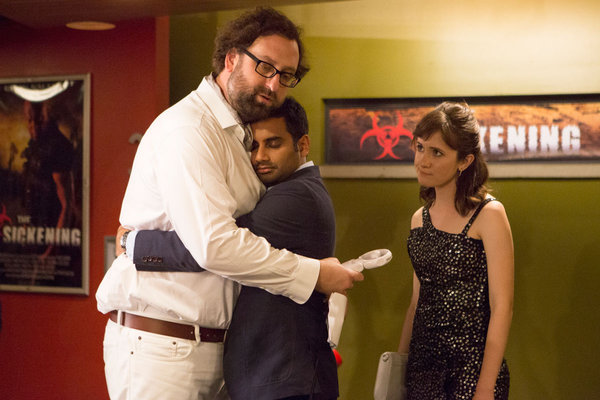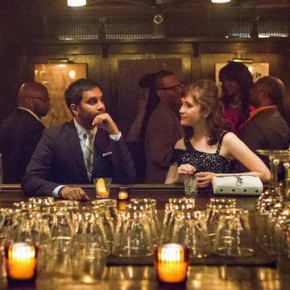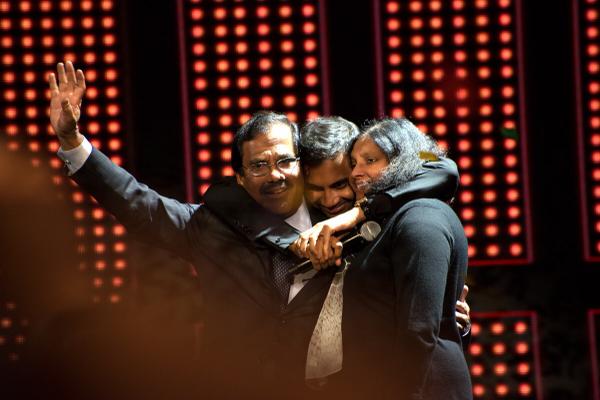

It’s been fun to keep up with Aziz Ansari since his turn as Tom Haverford in Parks and Rec. From stand up specials to pop-sociology books, his star has certainly been on the rise these past few years. Aziz’s latest project, the Netflix comedy Master of None, showcases not just Aziz the actor, but Aziz the storyteller and Aziz the cultural critic. TV critics are generally in agreement: Master of None is really good. Like, awards season good. Like, best show on TV this year good.
The show follows Dev, a loosely autobiographical Aziz, as he navigates life and love in New York. Normally an overdone premise, Aziz is able to integrate plenty of new conflicts for Dev to face, including racism, feminism, and second-generation immigrant struggles. The show is laugh out loud funny too. It takes some cinematic and storytelling cues from FX’s Louie, but the material is clearly saturated in Aziz’s trademark obsessions with pop-icons, technology, and the struggle to find meaningful and lasting love.
Where Master of None breaks new ground, however, is that the ten episode arc is an ode to one of our favorite subjects: the paralyzing fear of missing out. Good ol’ #FOMO is the heart of Master of None, and Aziz has explicitly mentioned in interviews how this analysis paralysis theme is at the heart of the show’s conflict. [Spoilers Ahoy!]
 So much of Master of None is beautiful and heartbreaking because all the characters are so likable but struggle with anxiety about commitment and regret. The opening scene of episode 10, titled “Finale”, is a metaphor for that anxiety: Dev devotes significant time to googling the best taco in town, only to arrive at his Yelp-approved food truck after they’ve run out of tacos. “What am I supposed to eat now, the second best taco?” cries an exasperated Dev, clearly dealing with more emotions outside of a culinary induced disappointment.
So much of Master of None is beautiful and heartbreaking because all the characters are so likable but struggle with anxiety about commitment and regret. The opening scene of episode 10, titled “Finale”, is a metaphor for that anxiety: Dev devotes significant time to googling the best taco in town, only to arrive at his Yelp-approved food truck after they’ve run out of tacos. “What am I supposed to eat now, the second best taco?” cries an exasperated Dev, clearly dealing with more emotions outside of a culinary induced disappointment.
Fear of that kind of disappointment permeates Master of None. Dev wrestles with the implications of having kids in the episode titled “Plan B”, when a contraceptive malfunction makes fatherhood a potential reality. What opportunity would kids bring? What opportunities would they take away? Are kids worth the hard work? In “Hot Ticket”, Dev stresses for days about which girl to take to the secret Father John Misty show. In “Old People”, Dev befriends an older generation of characters with their own series of disappointments and struggles. Those encounters fuel the fire to succeed in his younger years lest he grow old full of regrets cuddling a robot baby seal.
Even Dev’s relationship with Rachel, the storyline that ties much of the season together, is saturated with this fear. On their overwhelmingly charming first date, Dev discovers Rachel is a vegetarian only after they’ve decided to grab BBQ for lunch. Dev’s reaction to the discovery is telling: he immediately processes the implication of not being able to “go splitzies” on meat dishes with a spouse… for the rest of his life. A terrible opportunity lost, but one Dev is willing to consider for love.
 As Rachel moves in with Dev and the relationship mellows from excitement to routine, the boogeyman of commitment looms large. A potential job opportunity in Chicago makes for anxious questions about the future, questions that are made all the more scary by the fact that their relationship has become less sexy and exciting. The icing on the cake, which eventually forces a sad and gnarly breakup, is when Dev and Rachel attend a wedding together. The bride and groom write their own rich and moving vows, and as Dev hears their proclamations of love, he fears that he and Rachel will never experience the hallmark love this couple claims to share. That fear, sadly, drives Rachel to dye her hair and move to Tokyo.
As Rachel moves in with Dev and the relationship mellows from excitement to routine, the boogeyman of commitment looms large. A potential job opportunity in Chicago makes for anxious questions about the future, questions that are made all the more scary by the fact that their relationship has become less sexy and exciting. The icing on the cake, which eventually forces a sad and gnarly breakup, is when Dev and Rachel attend a wedding together. The bride and groom write their own rich and moving vows, and as Dev hears their proclamations of love, he fears that he and Rachel will never experience the hallmark love this couple claims to share. That fear, sadly, drives Rachel to dye her hair and move to Tokyo.
The great irony of the show, of course, is that Dev is surrounded by older adults with fewer choices and greater fulfillment. Dev’s parents (played with charm by Aziz’s actual parents!) had an arranged marriage and a happy life. After Dev plays “the other man,” in an extramarital affair, the married couple reconciles and rekindles a mutual love and affection. “A marriage is a beautiful thing that you make together… you don’t just blow up the whole thing because one piece is broken- you go and fix that part” says the offended husband to a forgiven Dev. Grandma Carol gives Dev a heartwarming and heartbreaking epiphany that old age and death arrive no matter how good we are at the ol’ carpe diem. The wisdom of the past is there for Dev to grasp, but that wisdom isn’t enough to allay Dev’s fear.
Returning to the season finale and the wedding vow anecdote– Aziz shared with the folks at The AV Club how that scene and the following breakup came to be:
That wedding scene at the beginning was based on a wedding I went to where these people did these vows that were very moving. They just seemed like a couple that was genuinely very, very happy and very much in love. After the wedding, a few couples [that attended] broke up, and one of those people that was actually at the wedding was our music supervisor [for the show]. And I told him about this, and he was like, “Oh my God, that’s crazy that you’re putting that in.” And whenever I watched the episode, there’s a song that’s playing when Dev is reading—it’s The Durutti Column or something like that. And I was like, “What is that song? It fits really well,” and he said, “Well, that’s a song I listened to a bunch after that wedding when I had that breakup and everything.” And I was like, “Oh, shit!” and he was like, “I went real method with the music direction.” So that’s how that scene kind of came together from all those angles.
Besides being an excellent anecdote for why nobody should write their own vows(!), it gets down to the root of Dev’s struggle: there exists a Plato-esque, mystically purposeful ideal of his life that will lead to happiness and fulfillment, and any deviation from that path will lead to a lifetime of despair. Aziz is tapping into something very potent here:
We were doing [a different] scene and a few of the crew came up to me and were like, “This is exactly how it feels in real life.” It all goes back to this other idea—and I don’t know whose quote this is—but it’s the idea that the most personal ends up being the most universal, and I’ve found that to be true in stand-up and in the show as well.

That’s what makes Aziz’s show so unique. It’s no use finger-wagging at Dev’s indecisiveness, or trying to pretend like we don’t the same thing. Fear of missing out is the curse of twenty-first-century affluent professional young people who make weekend trips to Nashville for first dates. Every time we’ve Yelped a restaurant, looked up city attractions on Trip Advisor, or hesitated to initiate romantic commitment because “the grass might be greener…” we’ve embrace that same fear that Aziz so helpfully articulates. A wasted opportunity is the twenty-first century sin.
But Master of None does something special: it makes you wish for an alternative for Dev. It makes you wish that there was a way of life devoid of fear, or infinite time to embrace all opportunities. It makes you wish Dev and Rachel could find a perfect love that wouldn’t let you down, a lover who wouldn’t fly off to Tokyo when things got tough, or a lover that doesn’t berate you for leaving your clothes on the floor. These, of course, are the longings of heaven- a search for that word of assurance that “every little thing is gonna be alright.” That’s the word Dev needs, and sadly, it’s not the word Dev gets.
The best part, by the way, about a love that “casts out all fear” is that it really does cast out all fears. Even the fear that the #1 taco truck in town is out of tortillas.

COMMENTS
5 responses to “Don’t Miss Out on Master of None”
Leave a Reply













The opening half of the second episode is sublime. The slow, deliberate, and intricate crafting of backstory for the two fathers is the kind of complex humor that is rarely attempted. The setup is long, but worth every moment. Can’t say I’ve ever seen anything quite like it.
That second episode is fantastic! Especially the ending with the guitar, which was, to me, a laugh out loud!
Excellent. Funny I just read this before your piece. 🙂
http://theweek.com/articles/587803/master-none-how-aziz-ansari-captures-bizarre-paradox-being-millennial